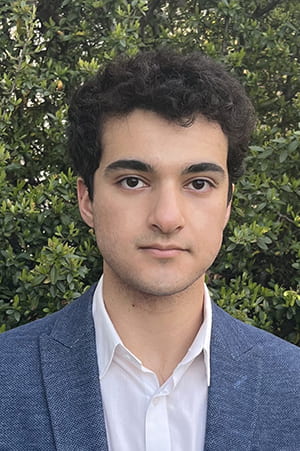Fischell Department of Bioengineering (BIOE) senior Erfan Jabari received the 2022 Winston Family Papers Award for Outstanding Honors Thesis during the University of Maryland (UMD) Honors College Citation Ceremony on Friday, April 29.
Established by Roger (’76, ’79) and Karen Winston (’75), the annual UMD Winston Honors Writing Awards recognize the best essays, research papers, and theses written by honors students.
Erfan, an undergraduate researcher in BIOE professor John Fisher’s Tissue Engineering & Biomaterials Laboratory, focused his thesis on critically-sized bone defect repair in orthopedic medicine.

“Bone tissue is naturally able to repair damage and regenerate completely, but medical intervention becomes necessary when a defect’s size is too large,” Jabari said. “Bone grafts – the current treatment option – are limited in supply and pose a significant risk of donor site morbidity or immune rejection. Bone tissue engineering aims to address these shortcomings by developing synthetic constructs that coordinate biomaterials, cells, and bioactive signals to facilitate tissue repair.”
In bone tissue engineering, mesenchymal bone-forming cells have been explored thoroughly as a tool for defect repair, he noted. The role of osteoclasts – their bone resorbing counterpart – has not been investigated as extensively. Recent bone physiology research shows, however, that osteoclasts have an interesting ability to interact with bone-forming osteoblasts and mesenchymal stem cells (MSCs) through a variety of mechanisms to stimulate bone formation. Motivated by this concept, Jabari and fellow members of Fisher’s lab sought to develop a system whereby osteoclast-directed bone formation could be observed and investigated for bone tissue engineering purposes.
“In this effort, we successfully developed a 2D coculture model of human MSCs and peripheral blood-derived monocytes (progenitors of osteoclasts),” he said. “Our system shows that bone formation is enhanced in conditions where osteoclast development is facilitated, corroborating evidence that osteoclasts support the activity of bone-forming cells. Specifically, we observed known features of osteoclast-directed bone formation such as MSC proliferation and matrix development, and a novel feature – MSC clustering.”
Ultimately, the group demonstrated the potential of osteoclasts in bone tissue engineering to inform future strategies for bone defect repair, Jabari said. The work, which revealed the ability of osteoclasts to induce MSC clustering, also provides an accessible system for further investigation of osteoclast-directed bone formation.
In addition to his Winston Family Honors Award, Jabari was also recently named one of the University of Maryland’s Undergraduate Researchers of the Year.
Jabari plans to graduate in December 2022, after which he hopes to explore an M.D./Ph.D. program.
“I am excited to expand on the experiences the Fischell Department of Bioengineering has granted me, wherever that may be!” he said.
Story from the Fischell Department of Bioengineering.

